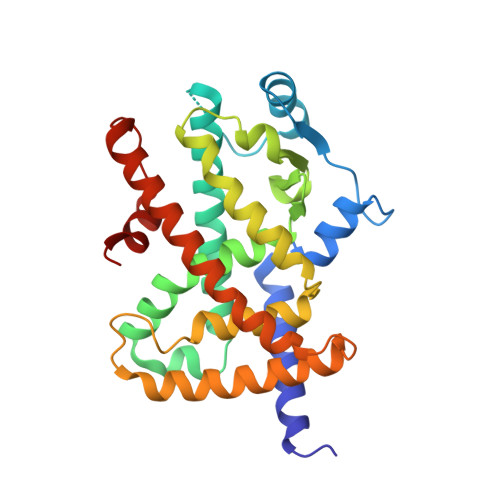Novel tricyclic-alpha-alkyloxyphenylpropionic acids: dual PPARalpha/gamma agonists with hypolipidemic and antidiabetic activity
Sauerberg, P., Pettersson, I., Jeppesen, L., Bury, P.S., Mogensen, J.P., Wassermann, K., Brand, C.L., Sturis, J., Woldike, H.F., Fleckner, J., Andersen, A.-S.T., Mortensen, S.B., Svensson, L.A., Rasmussen, H.B., Lehmann, S.V., Polivka, Z., Sindelar, K., Panajotova, V., Ynddal, L., Wulff, E.M.(2002) J Med Chem 45: 789-804
- PubMed: 11831892
- DOI: https://doi.org/10.1021/jm010964g
- Primary Citation of Related Structures:
1KNU - PubMed Abstract:
Synthesis and structure-activity relationships of tricyclic alpha-ethoxy-phenylpropionic acid derivatives guided by in vitro PPARalpha and PPARgamma transactivation data and computer modeling led to the identification of the novel carbazole analogue, 3q, with dual PPARalpha (EC(50) = 0.36 microM) and PPARgamma (EC(50) = 0.17 microM) activity in vitro. Ten days treatment of db/db mice with 3q improved the insulin sensitivity, as measured by OGTT, better than that seen with both pioglitazone and rosiglitazone treatment, suggesting in vivo PPARgamma activity. Likewise, 3q lowered plasma triglycerides and cholesterol in high cholesterol fed rats after 4 days treatment, indicating in vivo PPARalpha activity. Investigations of the pharmacokinetics of selected compounds suggested that extended drug exposure improved the in vivo activity of in vitro active compounds.
Organizational Affiliation:
Novo Nordisk A/S, Novo Nordisk Park E9 2.02, 2760 M?l?v, Denmark. psa@novonordisk.com

















